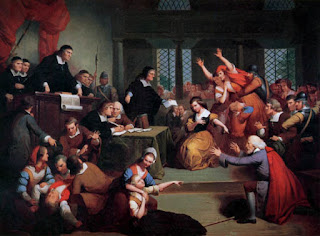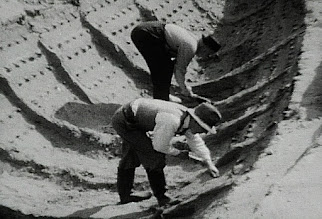January Overview
Another year has come and gone, we have been a bit quiet recently what with work, life and it being Christmas. But with a new year coming, we want to try and get more content out in the coming months, we've been working behind the scenes to get blogs done and ready to post, so watch this space. So what better way to kick the new year off, then a January overview.
 Agnes lived near Nether Keith in East Lothian in Scotland. She was seen as the local wise woman, who had healing powers and also acted as a midwife when needed. At the time of her trial it was made aware that she was a widow and had children. When James VI returned from Copenhagen in 1590, he was perplexed with getting rid of witchcraft and black arts from England. In the months after he returned a witch hunt was started in Denmark, this led to James VI setting up his own in Scotland. The arrest, trial and confessions of Agnes and other women accused was published in a London pamphlet in 1591 as well as other local newspapers.
Agnes lived near Nether Keith in East Lothian in Scotland. She was seen as the local wise woman, who had healing powers and also acted as a midwife when needed. At the time of her trial it was made aware that she was a widow and had children. When James VI returned from Copenhagen in 1590, he was perplexed with getting rid of witchcraft and black arts from England. In the months after he returned a witch hunt was started in Denmark, this led to James VI setting up his own in Scotland. The arrest, trial and confessions of Agnes and other women accused was published in a London pamphlet in 1591 as well as other local newspapers.
1st
1511 Henry VIII first son Henry, Duke of Cornwall was born
1515 Francis I of France ascends to the throne
1877 Queen Victoria becomes Empress of India
2nd
1096 William de St-Calais, chief counsellor to William II, died
1169 Bertrand de Blanchefort, sixth grand master of the Knights Templar, died
3rd
1437 Catherine of Valois dies
1521 Martin Luther was excommunicated by Pope Leo X
1892 J R Tolkien was born
4th
871 The Battle of Reading took place
1643 Issac Newton was born
1693 In Salem Rebecca Jacobs was put on trial for tormenting Elizabeth Hubbard
Rebecca was first accused by Elizabeth Hubbard, where she lived and worked as a servant. She was then later accused by the main group of girl accusers. Rebecca wasn't originally on the arrest warrant, but when Constable John Putnam went to arrest her husband George, he arrested her as well. She had to be persuaded to accompany him and he had to promise that she would soon return home. She remained in jail for eleven months. When she was examined she confessed to tormenting the girls and for working with the devil. In November her mother petitioned the court for the release her daughter saying that she was crazed and had a broken mind, due to being mentally ill.
When the new trials began in January, Rebecca was put on trial first. She was arraigned on the indictment of tormenting Elizabeth Hubbard during her examination in May as well as other times. Like the others around her she pleaded not guilty and the court ordered that she be freed as soon as her fees were paid. found not guilty. She was eventually released in March when her family could afford her jail fees.
5th
1066 Edward the Confessor dies
1589 Catherine de Medici dies
1762 Peter III becomes emperor of Russia, future Catherine the Great becomes Empress Consort
6th
1492 Isabella of Castile and Ferdinand of Aragon enter Granada in conclusion of the Granada War
1538 Jane Dormer, Lady in waiting to Mary 1, was born
Jane was born at Eythrope near Waddesdon in Buckinghamshire. Her father was Sir William Dormer of Wing, Buckinghamshire, and his first wife, Mary Sidney. She had three siblings, Thomas, Robert and Anne.
She was born during the reign of Henry VIII, and her family was split by the religious controversy caused by the Reformation. Once her mother does she spent her youth not only in the household of her paternal grandmother but also as a playmate of the young Edward VI.
Because of her faith and royal connections she would become one of Mary I's closest friends and confidantes. Mary I was reluctant to have her marry, in the end she made her own match and married Don Gomez Suarez de Figueroa of Cordova, Duke of Feria, close adviser to Philip II of Spain and husband of Mary I. The pair stayed away from court when Elizabeth came to the throne due to their religious differences.
They both moved to Spain when Don Gomez was replaced as ambassador. When her husband died, she carried on looking after his estates. Her health slowly declined and by the end she was bedridden. She had her funeral all prepared long before she died and kept a coffin in the house. She died on the 13th January 1612 and was buried in a monastery in Santa Clara in Zafra on the 26th January. Jane is also meant to be related to actress Natalie Dormer who played Anne Boleyn in The Tudors.
1540 Henry VIII marries his forth wife Anne of Cleves
7th
1536 Catherine of Aragon dies
1608 A fire destroys the first English settlement in Jamestown, Virginia
1912 Charles Addams, the creator of The Addams Family, was born
8th
871 Æthelred I and Alfred the Great set out to repel an invasion from Danelaw Vikings
1843 Frederick Abberline, police officer on the Jack the Ripper case, was born
1947 David Bowie was born
9th
1349 The population of Basel are rounded up and burnt as part of the Black Death
1431 The trial of Joan of Arc begins
1806 Horatio Nelson receives a state funeral in London
Nelson had been killed at the Battle of Trafalgar after a musket ball entered his left shoulder, pierced his lung and lodged in her shoulder blade. He was taken below decks and made comfortable. He died 3 hours after he was shot. His body was placed in a cask of brandy mixed with camphor and myrrh. The cask was lashed to the mast of HMS Victory and was placed under guard.
Victory was then towed to Gibraltar, where Nelsons body was placed in a lead-lined coffin filled with spirit of wine. When his body reached England it was unloaded at the Nore, then conveyed upriver to Greenwich. Nelson was then placed inside a led coffin and then a wooden coffin. He would then lay in state for 3 days at Greenwich Hospital.
His body was then taken up river by barge on the 8th where he stayed at the Admiralty for the night. The following day his body was taken by escort to St Paul's Cathedral. The funeral service lasted 4 hours. Nelson was then interred in the crypt and placed in a sarcophagus that was originally made for Cardinal Thomas Wolsey. The flags that were to be placed on his coffin were torn up and distributed around those in attendance as a way to remember the day. Locks of Nelson's hair was also cut off and placed in rings given to those that had served alongside him.
10th
1645 Archbishop William Laud is beheaded for treason
1654 Nicholas Culpeper, English botanist and astrologer, died
2016 David Bowie dies
11th
1372 Eleanor of Lancaster, Countess of Arundel, died
1569 The first lottery is recorded in England
1591 Robert Devereux, 3rd Earl of Essex, was born
12th
1405 Eleanor Maltravers, heiress of the first Baron Maltravers, was born
1692 Alice Parker's body was found in the middle of a road in Salem
Alice was accused of being a witch during the Salem Witch Trials in 1692. She was convicted along side Martha Corey, Mary Eastey, Ann Pudeator and Dorcas Hoar. All five women were convicted and then sentenced to hanging. Alice was also found guilty of the murder of Mary Warren's mother. In May Alice was charged with a number of acts, this included casting away Thomas Westgate and bewitching Mary Warren's sister. Margaret Jacobs also believed that she had seen Alice in an apparition on her farm. Alice denied all the accusations and asked for mercy from God.
In January, Alice's body was found lying in mud and snow seemingly dead. A local neighbour stated that she was prone to having fits of unconsciousness. Everyone was skittish about touching her due to the accusations of witchcraft in the village. Alice showed no signs of waking up even when she was dropped by a local man. She was taken to her home, where she was put to bed upon. Upon trying to undress her she bolted up right and started to laugh. Nobody at the time believed that it had any connection to the Witch trials.
Alice was hung on the 22nd September along with Mary Parker and Samuel Wardwell. She was exonerated of her crimes on 31st October 2001.
1895 The National Trust is founded in the United Kingdom
13th
858 Æthelwulf, King of Wessex, died
1477 Henry Percy, nobleman to Henry VII and Henry VIII, was born
1547 Henry Howard was sentenced to death for quartering Henry VIII Royal arms
14th
1892 Prince Albert Victor, Duke of Clarence and Avondale, died
1998 Lewis Carroll, author of Alice in Wonderland, died
1954 Marilyn Monroe married Joe DiMaggio
15th
1559 Elizabeth I is crowned Queen at Westminster Abbey
1569 Catherine Carey, lady in waiting to Elizabeth I, died
1759 The British Museum opened in London
1815 Lady Emma Hamilton, lover of Lord Nelson, died
16th
1501 Anthony Denny, friend of Henry VIII, was born
1537 Bigod's Rebellion takes place against the English Reformation
1572 Thomas Howard, was tried and found guilty for his part in the Ridolfi Plot
17th
1517 Henry Grey, 1st Duke of Suffolk, is born
1648 Long Parliament, breaks off negotiations with Charles I, starting the second phase of the Civil War
1912 Robert Scott reaches the South Pole a month after Roald Amundsen
18th
1486 Henry VII marries Elizabeth of York, uniting the York and Lancastrians
Henry was the heir to the Lancastrian throne and Elizabeth was heir to the York throne. Their marriage was put together by the help of both their mothers. Margaret Beaufort and Elizabeth Woodville both came to an agreement to join them both together as well as their families. Henry was slow to keep his promise of marriage to Elizabeth, but eventually saw that the marriage would be good for his rule. It seemed that he wanted full power of the crown and didn't want to share to power. Henry also had the Act of Titulus Regius repealed, this meant that the children of Edward IV were legitimate.
They needed a papal dispensation to allow them to marry due to them being related to John of Gaunt. Two were sent, the first locally and the second took a while to reach Rome and to then return to England. The marriage was approved by papal bull by Pope Innocent VIII. The wedding took place at Westminster Abbey and was officiated by Cardinal Bourchier, Archbishop of Canterbury. Eight months later Elizabeth gave birth to their first son Arthur. Even through the marriage was a political arrangement, it proved to be successful and by the time that Elizabeth died, they had both fallen in love with each other so much so Henry was heartbroken when she died.
1778 Captain James Cook discovers the Hawaiian Islands
1882 A.A Milne, creator of Winnie the Pooh, was born
19th
1419 Rouen surrenders to Henry V, completing his reconquest of Normandy
1544 Francis II of France was born
1901 Queen Victoria is stricken with paralysis
20th
1649 The High Court of Justice begins it's trial on Charles I
1961 Marilyn Monroe and Arthur Miller divorced
1993 Audrey Hepburn, English actress, died
21st
1793 Louis XVI of France was beheaded by guillotine
1869 Grigori Rasputin, Russian mystic, was born
1953 Marilyn Monroe's first major film, Niagara, was released in America
22nd
871 Battle of Basting - West Saxons were defeated by Danelaw Vikings
1552 Walter Raleigh, explorer to Elizabeth I, was born
1901 Queen Victoria dies
23rd
1264 The Second Barons War started with Henry III and Louis IX
1516 King Ferdinand II of Aragon died
1570 James Stewart, 1st Earl of Moray, regent to James VI of Scotland, is assassinated
24th
1536 Henry VIII has an jousting accident, leading to his leg ulcers and possible brain damage
1679 Charles II dissolves the Cavalier Parliament
1965 Winston Churchill, English Prime minister, died
25th
1515 The coronation of Francis I of France, takes place at Reims Cathedral
1533 Henry VIII and Anne Boleyn marry in secret
From 1526 Anne had caught the attention of the King, without really meaning to. She was always by Henry's side and always had his ear. Before they were married Anne was allowed to grant petitions, receive diplomats and give patronage. She also helped Henry when it came to foreign diplomats and issues. In September 1532 Henry granted Anne Marquessate of Pembroke, which at the time was a title appropriate for a future queen. Due to her rise in court, it also meant that her family would also rise to and gain land and titles.
In the winter of 1532 Henry took Anne to Calais to visit Francis I of France and to get support for his marriage to her. Upon their return to Dover, Henry and Anne married in secret on 14th November. Not long after Anne fell pregnant but the secret marriage was considered unlawful. A second wedding, that was in accordance with 'The Royal Book' took place in private in London in January 1533. Not long after the marriage, the Kings divorce to Catherine of Aragon began to move forward, it was declared null and void on 28th May 1553 at the same time Henry and Anne's marriage was declared good and valid.
1585 Walter Raleigh was knighted on his return from Virginia
26th
1436 Henry Beaufort, 3rd Duke of Somerset, was born
1564 The Council of Trent, makes it's official distinction between Roman Catholics and Protestants
1568 Lady Catherine Grey, Countess of Hertford, died
27th
1596 Francis Drake, Captain and explorer, died
1606 The trial of those in the Gunpowder Plot began
28th
1457 Henry VII is born
1547 Edward VI is proclaimed King on the death of his father Henry VIII
1591 Agnes Sampson, was executed after being found guilty of witchcraft

During the autumn of 1590, Scotland was awash of witch hunts, so much so that most women who were put on trial were questioned by the King himself. Agnes was accused by Gillis Duncan and was arrested with a few other people. They were then questioned about their role in local storm raising. Agnes was tortured in which she confessed. Her body was then shaved to reveal a witches' mark. She confessed that she caused the storm that caused Jane Kennedy, lady in waiting to Mary Queen of Scots, in 1589. It was also believed that the charm she used also caused the storm to rise when James returned from Denmark. She had also commented that she had tried to obtain the King's shirt so she could work other charms.
She had also stated that the devil had come to her and offered to help her and her children because she was a poor widow. Agnes went on to state that the English Ambassador, Robert Bowes, had given her a gold coin in which to charm that would harm the King, he denied any part in this. Agnes was interviewed by King James, who was sceptical at first but she seemed to relay the conversation James had on his wedding night. Until her last confession, James wasn't convinced that she was guilty, but what she said changed his mind.
On the 27th the charges of witchcraft were drawn up against her with fifty three points or articles. The following day Agnes was taken to a scaffold on Castlehill. Agnes was garroted instead of the traditional hanging or burning. The cost of her execution was itemised as £6 8s 10d. Her naked ghost is said to roam at the Palace of Holyroodhouse.
29th
1499 Katharina von Bora, wife of Martin Luther, was born
1845 Edgar Allen Poe's first publication 'The Raven' was published
30th
1520 William More, English courtier, was born
1649 Charles I is executed
31st
1606 Four members in the Gunpowder Plot were executed











Comments
Post a Comment